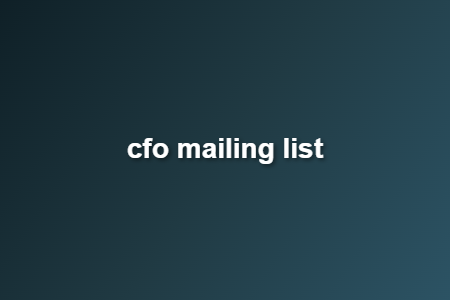In the world of business ! knowing who to talk to is very important. If you offer products or services that can help a company save money or grow its profits ! you want to reach the person in charge of money. That person is usually the Chief Financial CFO Mailing List: Officer ! or CFO. A “CFO mailing list” is a collection of addresses and contact details for these important leaders. These lists are designed to help you communicate directly with people who make big financial choices. This article will explain what a CFO mailing list is. We will look at why it can be so valuable. We will also discuss the best ways to find and use these lists responsibly. Our goal is to help you connect with top financial decision-makers effectively.
What Exactly Is a CFO Mailing List?
A CFO mailing list is a specialized collection of contact information. It primarily includes mailing addresses ! but often also email addresses and sometimes phone numbers ! for Chief Financial Officers. These lists are created by companies that gather business CFO Mailing List: data. Their main purpose is to provide businesses like yours with direct brother cell phone list access to top-level executives. This allows you to bypass many layers of staff. You can send your message straight to the person who holds the financial power.
These lists might also contain extra details. For instance ! the CFO’s full name and job title are typically included. The company’s name and its industry are usually there too. Sometimes ! you might even find information about the company’s size or yearly revenue. This additional data helps you target your outreach very precisely. Therefore ! a good CFO mailing list can be a powerful tool for focused business development.
Why Is It Important to Reach CFOs Directly?
Reaching CFOs directly offers significant strategic advantages for any business. First ! CFOs are the ultimate financial decision-makers. They control the budgets. They approve major spending. Your message goes straight to the person who can say “yes” to your proposal. This helps to shorten long sales cycles. Second ! CFOs are constantly looking for ways to improve their company’s financial performance. They seek solutions that can cut costs ! increase efficiency ! or boost profitability. Your product or service might be exactly what they need.
Third ! a carefully crafted message sent directly to a CFO demonstrates that you understand their role. It shows you value their time. This can make a strong ! positive impression. It often leads to more meaningful conversations. Therefore ! direct access to CFOs is highly sought after. It provides a direct channel to discuss high-level financial strategies and solutions.
Who Benefits from a CFO Mailing List?
Many different types of businesses find CFO mailing lists highly beneficial. Business-to-Business (B2B) companies are major users. They sell products or services specifically designed for other businesses. For example ! a software company offering advanced financial analytics tools. Financial consulting firms also use them. They offer expert advice on the authors of this unique project budgeting ! mergers ! or cost reduction. Enterprise software providers often target CFOs. They sell large-scale systems for accounting ! enterprise resource planning (ERP) ! or supply chain management.
Companies that provide cost-saving solutions also find these lists useful. This could include firms specializing in energy management ! waste reduction ! or efficient logistics. Investment firms and private equity groups frequently target CFOs. They look for opportunities to fund companies or propose acquisitions. In essence ! any business offering high-value solutions that impact a company’s bottom line can benefit from reaching CFOs directly.
Key Details Found in CFO Mailing Databases
A truly effective CFO mailing database contains more than just a name and address. It typically includes the CFO’s full professional name and exact job title. The name of their company is always present. Crucially ! the company’s industry sector is usually provided. This allows you to filter and target based on relevance. You might also find the company’s geographical location. More advanced databases often include approximate company revenue or the number of employees. This helps you identify businesses that align with your ideal customer profile and their capacity for your solutions.
Some premium databases might even offer direct phone numbers or links to their LinkedIn professional profiles. Having this comprehensive ! rich data enables you to personalize your outreach profoundly. It helps you tailor your message to resonate specifically with each CFO’s unique business context and financial priorities. This depth of information makes your direct mail or email campaigns much more impactful and likely to receive attention.
How Are These Databases Compiled?
Companies that compile CFO mailing databases use a variety of sophisticated methods to gather their information. They start by scouring public records. This includes publicly available corporate websites. They review official press releases and news articles. Financial reports and regulatory filings (like SEC documents in the US) are also rich sources of data. Business directories ! both online and offline ! are frequently utilized. Some data providers collect information by attending industry events and conferences or by subscribing to specialized publications. Advanced technological tools ! often involving web scraping ! are used to automate the collection of large volumes of publicly accessible data.
However ! the most reputable database providers go beyond mere collection. They meticulously verify the gathered data. This often involves human verification processes ! such as calling companies to confirm executive details or cross-referencing information from multiple reliable sources. Regular updates are absolutely crucial. Executive roles change frequently ! companies merge or dissolve ! and contact details can become outdated. Therefore ! high-quality providers continuously refresh their databases to ensure the highest possible accuracy and relevance for their clients.
Advantages of Using a CFO Mailing List
Using a carefully sourced CFO mailing list offers several compelling advantages for your business development efforts. It provides efficiency because you can quickly compile a list of top-tier financial contacts ! saving countless hours that would otherwise be spent on manual research. It enables precise targeting ! allowing you to filter leads by industry ! company size ! or specific financial needs ! ensuring your message reaches the most relevant CFOs. It also helps you scale your marketing and sales efforts significantly ! as you can reach a large number of CFOs simultaneously ! expanding your overall market reach.

Furthermore ! a well-targeted mailing list helps you bypass gatekeepers who might otherwise filter out your communications ! delivering your message directly to the person with significant financial authority. This direct access substantially increases your chances of getting a response or initiating a valuable conversation. It can also help you penetrate new markets or industries by quickly identifying key financial players. Ultimately ! leveraging a quality CFO mailing list can dramatically accelerate your business growth and improve your revenue generation potential by connecting you directly with crucial decision-makers.
Legal and Ethical Responsibilities: A Critical Guide
The use of CFO mailing lists ! like any business contact data ! comes ao lists with very important legal and ethical responsibilities. The foremost concern is data privacy. Laws such as the General Data Protection Regulation (GDPR) in Europe and the California Consumer Privacy Act (CCPA) in the United States strictly regulate how you collect ! store ! and utilize personal data ! including professional contact information. In most cases ! especially for unsolicited marketing communications ! you need explicit “consent” from individuals before sending them direct mail or emails. This means they must have clearly agreed to receive your messages.
Many purchased lists are considered “cold” lists ! meaning the individuals on them have not directly opted-in to receive communications from your specific company. Sending unsolicited mail or emails to such lists can be illegal in numerous jurisdictions and can severely damage your business’s reputation. Always meticulously investigate the source and compliance practices of any list provider you consider. Ensure that the list fully adheres to all relevant data privacy laws in the regions where you intend to send your mail. Non-compliance can lead to substantial financial penalties and irreparable brand damage ! making due diligence absolutely critical.
GDPR and B2B Mailing: Navigating the Rules
The General Data Protection Regulation (GDPR) is a comprehensive data protection law. It applies to any organization that processes the personal data of individuals residing in the European Union (EU) ! regardless of where the organization itself is located. For Business-to-Business (B2B) mailing ! particularly email marketing ! the concept of “legitimate interest” is often cited as a potential legal basis for processing data without explicit consent. This generally means you can send communications if there’s a genuine and relevant business reason ! and the individual’s rights and freedoms are not overridden.
However ! relying solely on “legitimate interest” is complex and requires careful assessment. It does not automatically grant permission for all unsolicited marketing. Under GDPR ! individuals possess significant rights over their data ! including the right to access their information ! rectify it ! and demand its erasure. You are also legally required to provide a clear and easy mechanism for recipients to opt out of future communications. Always be fully transparent about your data collection and usage practices. While “legitimate interest” might apply in specific ! well-justified B2B scenarios ! direct explicit opt-in is generally the safest and most transparent approach ! especially for ongoing email campaigns.
